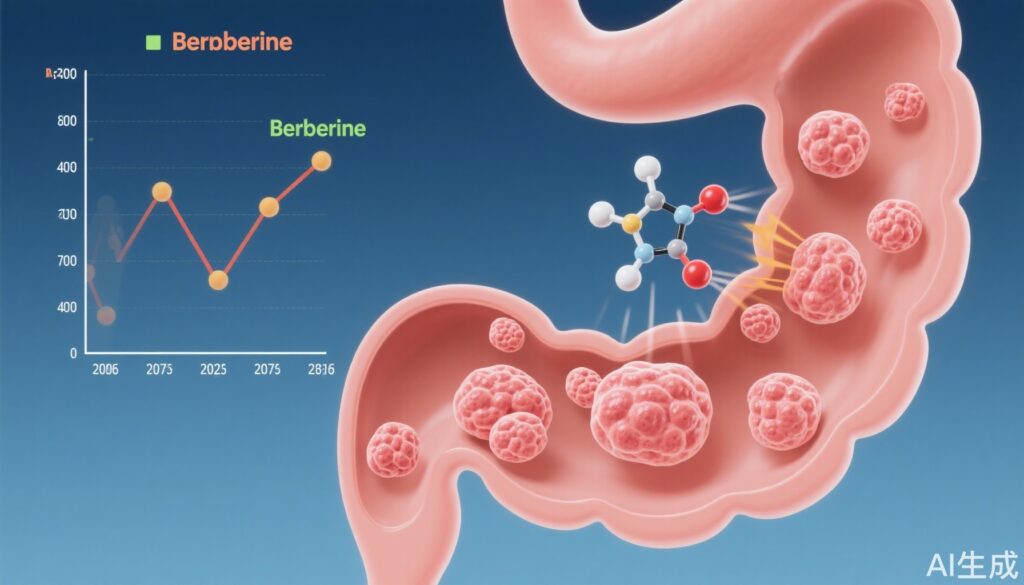Highlight
Berberine, administered orally for 2 years, significantly reduces colorectal adenoma recurrence after endoscopic polypectomy with sustained effects lasting over 6 years post-treatment.
Low recurrence rates (34.7% vs 52.1%) and reduced colorectal neoplasm incidence (63.4% vs 71.0%) indicate durable and clinically meaningful chemopreventive benefit.
Safety profile is favorable, and the agent offers a cost-effective, accessible option for secondary prevention of colorectal neoplasms.
Study Background and Disease Burden
Colorectal cancer (CRC) ranks as the third most common malignant tumor worldwide in incidence and mortality, as indicated by the 2023 GLOBOCAN data. The majority of CRC cases develop via the adenoma-carcinoma sequence, whereby colorectal adenomas represent the principal precursors. Endoscopic removal of polyps is the cornerstone for preventing CRC progression. However, a significant proportion of patients experience adenoma recurrence after polypectomy, thereby maintaining elevated risk for subsequent malignancy.
This clinical challenge highlights an unmet need for effective, safe, and economical chemopreventive agents that can reduce recurrence risk post-polypectomy. Currently, no standard pharmacological intervention with sustainable long-term efficacy is widely adopted or recommended for this indication.
Study Design
A landmark randomized, double-blind, placebo-controlled clinical trial published in Lancet Gastroenterology and Hepatology (2020) evaluated oral berberine hydrochloride administration for two years versus placebo in patients following colorectal adenoma resection. The trial enrolled several hundred patients and tracked recurrence outcomes and safety metrics.
The recent extended follow-up study, with median 78 months (approximately 6.5 years), builds on this primary trial by assessing the long-term efficacy and durability of berberine’s preventive effects during and after cessation of treatment. Data on adenoma recurrence, overall neoplasm occurrence, and safety outcomes were analyzed using hazard ratios (HR), relative risks (RR), odds ratios (OR), and confidence intervals (CI).
Key Findings
Initial trial results demonstrated a significant reduction in adenoma recurrence — 36% in the berberine group versus 47% in the placebo group—corresponding to a relative risk of 0.77 (95% CI: 0.66–0.91; P=0.001).
The extended follow-up further revealed that 34.7% of berberine-treated patients experienced adenoma recurrence compared with 52.1% of placebo patients (adjusted HR 0.58, 95% CI: 0.45–0.74; P<0.001). Sensitivity analyses upheld these findings (adjusted HR 0.62; 95% CI: 0.49–0.79).
Remarkably, the protective effect of berberine became statistically significant from the third year post-randomization and remained robust from year five onward (OR 0.50; 95% CI: 0.35–0.70).
Regarding overall colorectal neoplasms (adenomas plus serrated lesions and other polyps), cumulative incidence was lower in the berberine group (63.4% vs. 71.0%; adjusted HR 0.75, 95% CI 0.62–0.91; P=0.004). Notably, the reduction in neoplasm occurrence was significant in the 3–5-year and ≤5-year post-trial periods.
The incidence of serrated lesions trended lower with berberine (HR 0.72; P=0.05), though hyperplastic polyps, sessile serrated lesions, and traditional serrated adenomas showed no significant differences between groups.
Colorectal cancer incidence was very low and comparable between groups (0.3% each).
Safety data indicated no significant adverse effects attributable to berberine over the treatment and follow-up period, supporting good tolerability.
Expert Commentary
This groundbreaking study establishes berberine as a promising agent for secondary chemoprevention in colorectal adenoma patients. The long-term durability of its efficacy after discontinuation is unprecedented and clinically meaningful. The low cost and favorable safety profile support its potential wide adoption.
However, the study’s limitations include single-center design and lack of diverse populations; further multicenter and international studies would strengthen generalizability. Moreover, while adenoma recurrence is a validated surrogate endpoint, conclusive evidence linking berberine to reduced CRC incidence and mortality requires very long-term data.
Mechanistically, berberine exerts anti-inflammatory, anti-proliferative, and microbiome-modulating effects, which likely underpin its chemopreventive actions.
Conclusion
Berberine hydrochloride offers an effective, safe, and durable intervention to reduce colorectal adenoma recurrence and neoplasm occurrence following endoscopic resection. This novel chemopreventive strategy addresses a significant unmet clinical need, potentially mitigating colorectal cancer risk on a population scale.
Implementation in clinical practice as an adjunct to endoscopic surveillance may improve long-term patient outcomes and reduce healthcare costs. Additional trials in broader patient populations and evaluations of impact on CRC incidence and survival are warranted.
References
Tan YJ, Zou TH, Yu K, Sheng JQ, Jin P, Zhang MJ, Zou XP, Dou XT, Liu SD, Huang SH, Ren JL, Yang XN, Liu ZJ, Sun XM, Wang BM, Cao HL, Zhang YX, Gao QY, Chen HM, Cui Y, Chen YX, Fang JY. Berberine for preventing colorectal adenoma recurrence and neoplasm occurrence: 6-Year follow-up of a randomized clinical trial. Cell Rep Med. 2025 Aug 6:102293. doi: 10.1016/j.xcrm.2025.102293 . Epub ahead of print. PMID: 40795846 .




